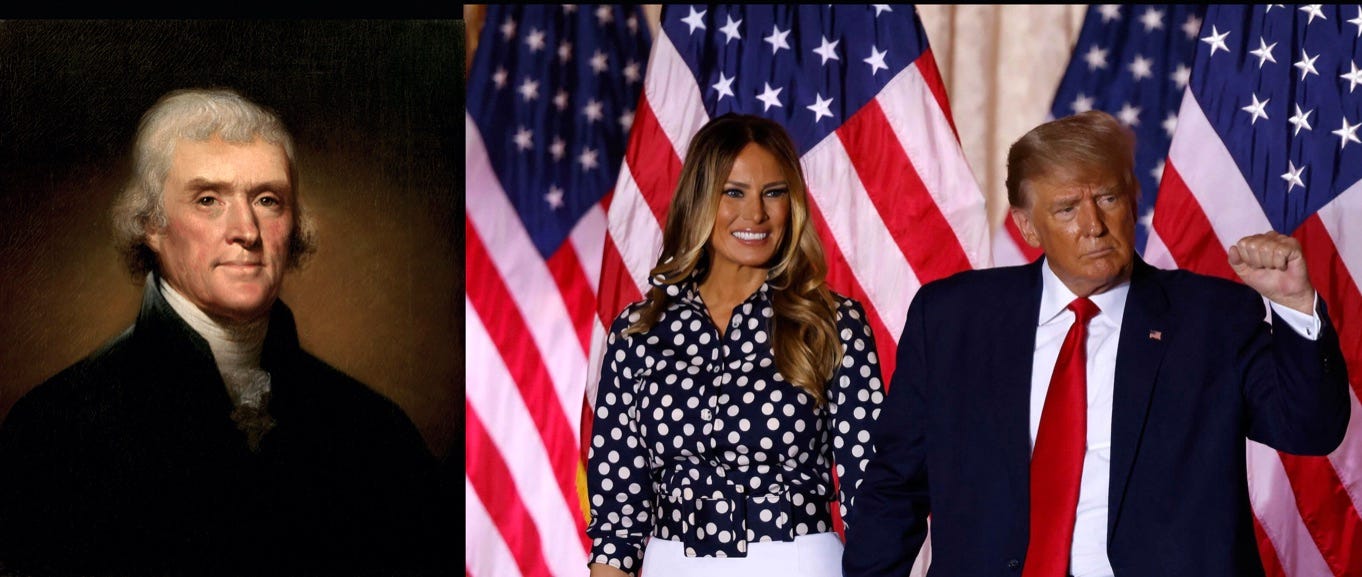As I drove across America this summer, I met scores of beautiful people - ordinary Americans, generous, open, folksy, even self-deprecating Americans - who seemed to inherit either through the blood that flowed in their veins or by a transfusion of that blood, a unique albeit subconscious awareness of their unique destiny amongst the nations.
And like Louis Armstrong, I thought to myself - what a wonderful people! And what an enormous tragedy that their ruling class is so pathetically unworthy of them!
Today, America is the envy of the world, including for us here in Canada. Some of the envy is grudging, but most is rooted in the world’s own realization of the uniqueness of the experience of this still young nation.
Most of the world thinks of “democracy” in rather undefinable terms such as “the rule of the people” or “accountable government” or even, “exercising one’s right to vote.”
But few realize that all our modern ideas of democracy owe their inception to the beginnings of the American nation. Jeffersonian democracy was the high point, the defining ideal of a type of system which Lincoln famously described as a government “of the people, by the people and for the people.”
The English civil war (150 years prior to American Independence) and Cromwell’s challenge to the King’s “divine right to rule,” undoubtedly laid some of the foundational stones of the American nation, when many of those same Englishmen crossed the Atlantic to the American wilderness to start a new nation. But there was nothing resembling Jeffersonian democracy in England when the Declaration of American Independence or the American Constitution were written.
To their credit, the Victorians in Britain in turn, learned from the (unruly) Americans and incorporated for themselves most of the ensconced ideas of a free press, free speech and freedom of conscience that Jeffersonian democracy had bequeathed to the world.
The world ought to have paid attention to clues that emerged at the founding of the nation about the extraordinary exceptionalism of the American experience.
In the latter half of the 18th century, America was in effect, a large wilderness of dense often impassable forest, bogs, hostile natural wonders and dangerous animals. There was no electricity, no central heating, no proper roads and no consistently reliable means of transport.
The writers and founders of the American Declaration of Independence and the American Constitution grew up in this frontier, wilderness nation. They did not have a learned tradition of national scholarship they could rely on.
How did this upstart, foundling nation produce in the short span of three or four decades leaders and scholars who almost every other nation would struggle to produce in three or four centuries? John Adams, Patrick Henry, Thomas Jefferson, James Madison, Benjamin Franklin, John Jay, George Washington, Samuel Adams, John Hancock, George Mason, Peyton Randolph -
Thomas Jefferson was 33 years old when from the second floor of a rented house, in the space of just over two weeks, he wrote the Declaration of Independence of the new, American nation, whose preamble of course, begins with the famous words:
"We hold these truths to be self-evident, that all men are created equal, that they are endowed by their Creator with certain unalienable Rights, that among these are Life, Liberty and the pursuit of Happiness.—That to secure these rights, Governments are instituted among Men, deriving their just powers from the consent of the governed.”
In 1831, the French traveller and emissary Alexis de Tocqueville studied this new, miraculous nation for nine months and then wrote his two volume classic, “Democracy in America,” published in 1835.
Tocqueville had unmistakably recognized the heart, the beating life-force, the living soul of American life and government. “There is no country in the world,” he wrote, “where the Christian religion retains its influence over the souls of men than in America; and there can be no greater proof of its utility and its conformity to human nature than that its influence is powerfully felt over the most enlightened and free nation of the earth.”
The election of Donald Trump yesterday to the highest office of President of the United States is another miracle. Another sign of American exceptionalism. A sign that God in His Mercy has decided to give America and the world another chance, another lease of life.
Perhaps the nay sayers of our civilization are wrong.
As for me, I am dumbstruck at the magnificence and all-encompassing sovereignty of God’s purposes and with the poet William Cowper can only exclaim:
God moves in mysterious ways
His wonders to perform.
And perhaps too, with Cowper, I may hope that this will be the dawning of a new and unprecedented era:
His purposes will ripen fast,
unfolding every hour;
the bud may have a bitter taste,
but sweet will be the flow'r.
Congratulations America! God bless you.





Thank you for this wonderful summary of the goodness of God and all the people He has created. Many of our Founding Fathers were learned of the Bible and had the wisdom of God. Many of us were praying and fasting for God’s mercy. We do know that: “Blessed is the nation whose God is the LORD.” And we have been praying for Spiritual Revival and Unity, since we know a House divided against itself will not stand. It has been wonderful to be a part of people coming together and seeking the LORD.
Dear Dr. Christian-- Thank you so very much for your stunning essay.
Peter and I completely agree that the election is "A sign that God in His Mercy has decided to give America and the world another chance, another lease of life." and we are deeply grateful.
We are also deeply grateful for friends all over the world who have not turned their back upon America when she has stumbled. Thank you for being our friend, and America's friend. ~Ginger